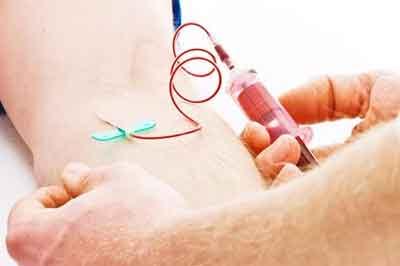- Home
- Editorial
- News
- Practice Guidelines
- Anesthesiology Guidelines
- Cancer Guidelines
- Cardiac Sciences Guidelines
- Critical Care Guidelines
- Dentistry Guidelines
- Dermatology Guidelines
- Diabetes and Endo Guidelines
- Diagnostics Guidelines
- ENT Guidelines
- Featured Practice Guidelines
- Gastroenterology Guidelines
- Geriatrics Guidelines
- Medicine Guidelines
- Nephrology Guidelines
- Neurosciences Guidelines
- Obs and Gynae Guidelines
- Ophthalmology Guidelines
- Orthopaedics Guidelines
- Paediatrics Guidelines
- Psychiatry Guidelines
- Pulmonology Guidelines
- Radiology Guidelines
- Surgery Guidelines
- Urology Guidelines
Old blood as good as new for transfusion: study

Toronto : Using fresh blood for transfusions may not boost patient survival, according to a new study which contradicts the common perception that stored blood could be harmful.
The study of about 31,500 patients at six hospitals in four countries showed that having a transfusion with the freshest blood did not reduce the proportion of patients who died in hospital.
"It is been a contentious issue, but our study finally puts an end to the question about whether stored blood could be harmful and fresher blood would be better," said lead author Nancy Heddle, from McMaster University in Canada.
"Our study provides strong evidence that transfusion of fresh blood does not improve patient outcomes, and this should reassure clinicians that fresher is not better," said Heddle.
She added that the results are also good news for blood suppliers worldwide as having a supply of stored blood helps to ensure that blood is available when a patient needs it.
The 31,497 adult patients studied were at hospitals in Australia, Canada, Israel and the US. The mortality rate was 9.1 per cent with people receiving the freshest blood, and 8.7 per cent among those receiving the oldest blood.
There was no significant difference when looking at the patient's blood type, diagnosis, hospital or country.
More than 40 studies published earlier have failed to adequately answer the question about whether the freshest blood was best, said John Eikelboom, from McMaster.
"Blood transfusions are a common medical intervention," he said.
"Advances in blood storage now allow blood to be stored up to 42 days before transfusion and the usual practice is to use up the blood that has been in storage the longest," he added.
"However there are biochemical, structural and functional changes in the blood during storage, there had been concerns about the use of 'older' blood. This study reassures us that ageing is not bad even for blood," he said.
The study was published in the New England Journal of Medicine.

Disclaimer: This site is primarily intended for healthcare professionals. Any content/information on this website does not replace the advice of medical and/or health professionals and should not be construed as medical/diagnostic advice/endorsement or prescription. Use of this site is subject to our terms of use, privacy policy, advertisement policy. © 2020 Minerva Medical Treatment Pvt Ltd